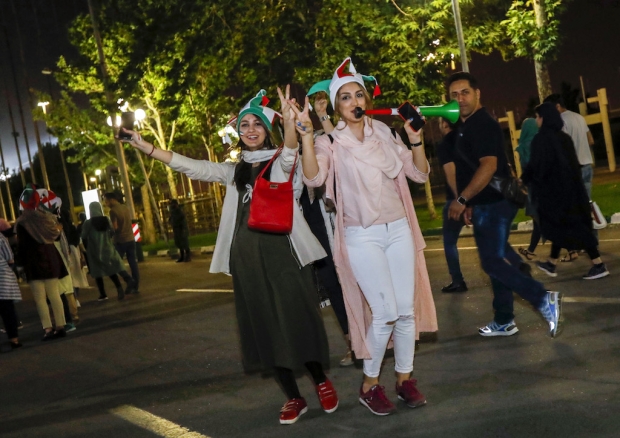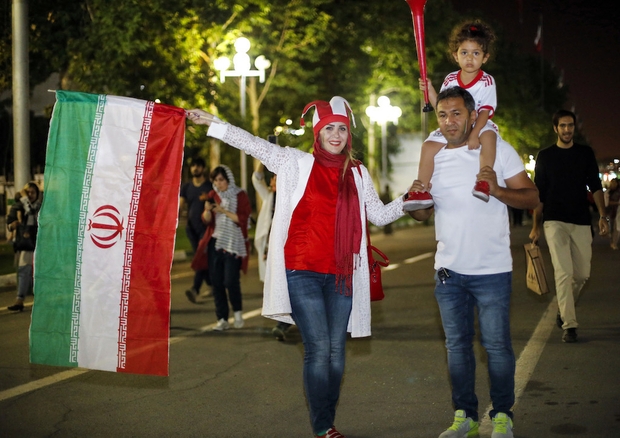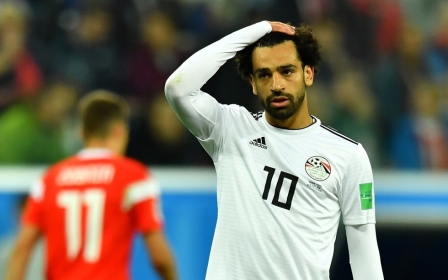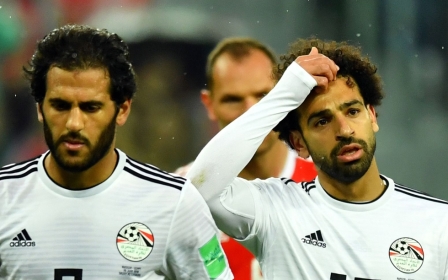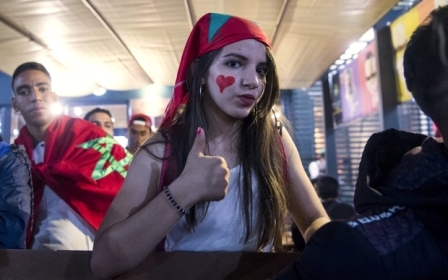'We need this joy': How the World Cup is uniting Iranian society
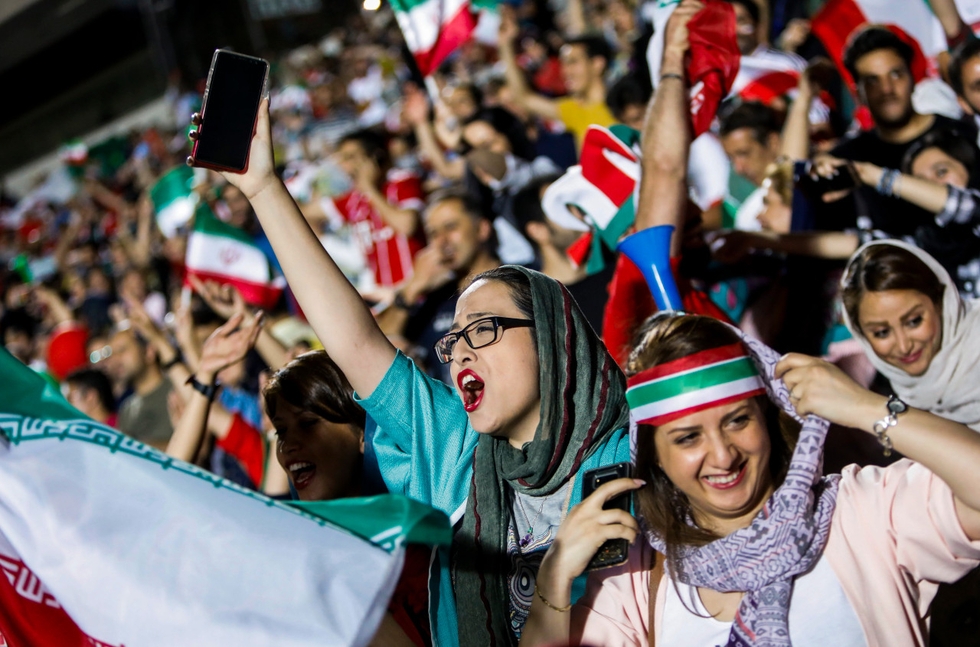
TEHRAN - It was a moment of jubilation following the Iranian team's first victory in the 2018 Russian World Cup when they beat Morocco 1-0.
Friday's victory marked Iran’s second ever win in the World Cup - their last victory was in the 1998 World Cup when they defeated the United States 2-1.
As soon as the referee blew his whistle to announce the end of the match, Iranian football fans took to the streets across the country to celebrate their win.
Unlike June 2017, when many - but not all - Iranians publicly celebrated the victory of Iranian President Hassan Rouhani in the presidential elections, last week saw a country unified in victory.
The winning match was celebrated by the old and the young, the reformists and the conservative "principalists", and even Iranian political dissidents.
The people needed this pleasure. Although I am not very much into football, when I see it can make the society delighted, why should I get sad?
- Ali, Tehran resident
The scenes of celebration were all the more significant because they have taken place against a backdrop of numerous economic hardships: the sharp decline in the value of Iranian rial against foreign currencies, the increased price of basic goods, and fear that the US will reinstate sanctions after its withdrawal from the nuclear deal.
On Shahid Beheshti Street, situated in the heart of Tehran, three young men and women honked the horn of their Peugeot 206 car, waving the Iranian flag.
"We are very happy. It was really an enjoyable win that we did not expect at all," said one of them, Shirin, sitting in the passenger seat.
"After hearing loads of bad news, we needed such a joy. Tonight, we want to be out until the morning and listen to loads of music and be happy."
Further down on Valiasr Street, the celebrating crowd caused major traffic jams.
Ali, one of the drivers, said he had been stuck in traffic for two hours, but did not care.
"It usually takes about half an hour to get home from here. But it does not matter at all," he explained.
"The people needed this pleasure. Although I am not very much into football, when I see it can make the society delighted, why should I get sad? Spending a night out in the hustle and bustle of the city and getting stuck in a traffic jam does not matter at all."
Maryam Rezaei, an Iranian sociologist, told Middle East Eye that football provided an outlet for Iranians living increasingly precarious lives.
"The fact is that economic problems have put a lot of pressure on society and these pressures have deprived people of happiness," she said.
"As a result, we can see a victory in a sports competition has a huge impact on society and draws old, young, traditional and stylish people to the streets. In fact, football, which is so popular in Iranian society, can be considered a common ground for various groups."
The diversity of the crowds celebrating Morocco's defeat was apparent.
Not only did youths take to the streets, but also a large number of families. On Pasdaran Street, located in northern Tehran and inhabited by a large number of religious families, MEE met a family of four at around midnight.
The father of the family, who looked to be about 55, was setting off fireworks along with his son, young daughter and his wife.
"We need these kinds of joy ourselves," he said. "It is a great honour to see our national team win in the world championship. You see Saudi Arabia’s team was humiliated by Russia and conceded five goals, while our players shined without having enough matches in preparation for the World Cup."
Such was Iranian pride at leading Group B in the competition, that Azadi stadium, Tehran's largest football ground, opened its doors on Wednesday night to women and men – admitting the former for the first time since the Islamic revolution of 1979 - for Iran's second group game against Spain.
Initially, authorities said the stadium would remain closed for the game but then later they relented and thousands of enthusiastic fans poured in to watch the match on screens.
And even though the result was not as favourable as last week's game, Spain won 1-0, Iran put in a brave performance, delighting home fans yet again.
'Police are with the people'
On 15 June, Amir Hossein Etmadi, an anti-Iranian government activist in Washington DC and the spokesman of Iranian Liberal Students and Graduates (ILSG) posted a critical message on his Twitter account about one of the Iranian players:
"Hate speech is against FIFA's moral and professional codes. FIFA must ban Mehdi Taremi and oust him from the World Cup."
Mehdi Taremi had previously posted a message on his Twitter account quoting a comment from Iran’s Supreme Leader Ayatollah Khamenei stating "Israel will not survive next 25 years".
Etemadi, who had repeatedly backed a hawkish stance towards the Iranian government, reacted by launching a #Taremiban campaign on Twitter and called on FIFA authorities to ban him from the tournament.
There has to be more freedom for the people, but one cannot deny that this little amount [of freedom] is better than nothing
- Leila Ashouri, psychologist
Although Taremi removed his post right after noticing the campaign, it appears that Iranian Twitter users did not pay much attention to Etmadi's campaign.
Iranian authorities also did not react negatively to the street crowds on the night after Iran's victory over Morocco, despite hardliners' negative stance on youths taking to the streets.
In a statement following the match, Tehran’s police commander Brigadier General Hossein Rahimi stated "the police are with the people at the time of happiness" and announced that he had "banned cars from entering the pavements and streets that people were crossing joyfully".
Psychologist Leila Ashouri told MEE that the football victories were like a tranquilliser - while they could not resolve the problems in the long run, they were necessary.
"There has to more freedom for the people, but one cannot deny that this little amount [of freedom] is better than nothing," she said.
In the lead-up to the World Cup, the Iranian football team faced more hurdles than most: a combination of political tensions and travel restrictions limited its ability to play friendlies ahead of the tournament and the decision by Nike not to supply boots for Team Melli, as the side is known, was another blow.
Despite this, the team and its Portuguese coach, Carlos Queiroz, have put in a solid performance and have done something incredible - united all of Iran.
This article is available in French on Middle East Eye French edition.
New MEE newsletter: Jerusalem Dispatch
Sign up to get the latest insights and analysis on Israel-Palestine, alongside Turkey Unpacked and other MEE newsletters
Middle East Eye delivers independent and unrivalled coverage and analysis of the Middle East, North Africa and beyond. To learn more about republishing this content and the associated fees, please fill out this form. More about MEE can be found here.


